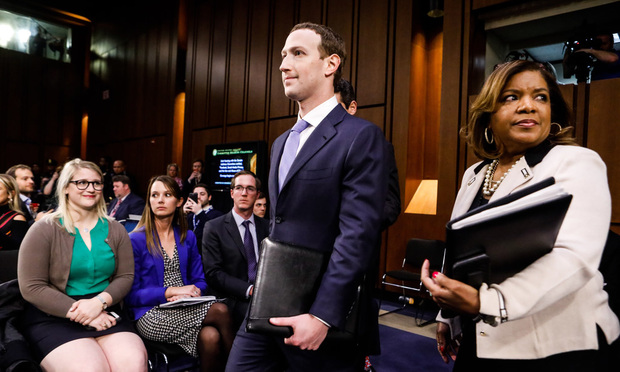Illinois Biometric Privacy Law—and Effort to Carve Out Exceptions—Gets Moment in Spotlight at Facebook Hearing
Business interests are aiming to roll back portions of an Illinois law meant to protect biometric identifiers such as fingerprints and facial structure.
April 10, 2018 at 08:07 PM
4 minute read

About 90 minutes into Mark Zuckerberg's testimony on Capitol Hill on Tuesday, in which the Facebook CEO was grilled on the social media company's privacy practices, U.S. Sen. Dick Durbin, D-Illinois, gave a shout-out to his home state's Biometric Information Privacy Act, or BIPA—a law governing the collection and storage of biometric indicators like fingerprints, facial features and iris scans.
“We're now in a fulsome debate on that,” said Durbin, referring to proposed legislation in Illinois to roll back portions of the law. “I'm afraid that Facebook has taken the position of trying to carve out exceptions to [BIPA]. I hope you'll fill me in on how that is consistent with protecting privacy,” Durbin said.
Durbin's pro-BIPA commentary came as a committee of the Illinois state Senate prepares to hold a hearing Thursday on proposed modifications to the state law.
Critics including the Illinois Chamber of Commerce claim the law has prompted a spate of litigation against Illinois business, especially as workplace fingerprint scanners become more commonplace. The proposed changes would allow companies to collect biometric data without consent so long as they protect it in the same way they handle other sensitive data. The changes would also limit claims under BIPA to those using biometric data for commercial purposes, and exempt companies using biometrics for security purposes.
“We've got members who are being sued and they're coming to us saying, 'What the hell is this thing?'” said Tyler Diers, the director of legislative relations for the Illinois Chamber. Diers said that as of December 2017 he had counted nearly 40 private lawsuits targeting Illinois business over fingerprint scans alone. He noted that while Texas and Washington have followed suit with their own biometric laws since BIPA was enacted in 2008, those laws don't include a private right of action.
“Other states that have followed our lead seem to let employers use this technology without being subject to” a wave of litigation, he said.
Patrick Castle, an associate at Shook, Hardy & Bacon who also has been tracking BIPA litigation, said that the current wave of suits fall “pretty far away” from the original intent of the law: to govern how biometric identifiers were used in conducting financial transactions.
Castle pointed out that defendants landed a significant win in BIPA cases from an Illinois appellate court in a case called Rosenbach v. Six Flags Entertainment. There the Second District Appellate Court of Illinois held that plaintiffs must allege “actual harm” to get BIPA claims to stick. The plaintiffs in the Six Flags case are seeking review from the state's high court. Castle said that the proposed legislation would go a step further than the appellate court to make it “more difficult for creative plaintiff lawyers from coming up with clever things to allege to get past motion to dismiss” and nudge defendants into settlement talks.
The proposed changes could also potentially have an outsized impact on Facebook. The company faces class action lawsuits in federal court in San Francisco claiming that Facebook violated BIPA with its “tag suggestions” function, which prompts users to identify friends in pictures uploaded to Facebook. Facebook faces significant potential exposure since BIPA carries statutory damages of $1,000 for negligent violations, and $5,000 for those that are “intentional and reckless.”
Facebook declined to comment on the pending legislation.
Adam Schwartz, a senior staff attorney with Electronic Frontier Foundation, a BIPA proponent, said that the proposed changes would “effectively gut” BIPA and likely sidetrack the Facebook litigation, which is currently set for trial in July before U.S. District Judge James Donato of the Northern District of California.
“It's an ironic moment here, when all eyes are turned on congressional hearings on data privacy, here in Illinois people are trying to reduce data privacy,” Schwartz said. “It's the wrong direction.”
This content has been archived. It is available through our partners, LexisNexis® and Bloomberg Law.
To view this content, please continue to their sites.
Not a Lexis Subscriber?
Subscribe Now
Not a Bloomberg Law Subscriber?
Subscribe Now
NOT FOR REPRINT
© 2025 ALM Global, LLC, All Rights Reserved. Request academic re-use from www.copyright.com. All other uses, submit a request to [email protected]. For more information visit Asset & Logo Licensing.
You Might Like
View All
California Walnut Grower and German Investment Firm Vie for Lead Plaintiff Status in Super Micro Securities Action

Judge Recommends Disbarment for Attorney Who Plotted to Hack Judge's Email, Phone
3 minute read

Orrick Hires Longtime Weil Partner as New Head of Antitrust Litigation
Trending Stories
- 1'Incredibly Complicated'? Antitrust Litigators Identify Pros and Cons of Proposed One Agency Act
- 2'A Warning Shot to Board Rooms': DOJ Decision to Fight $14B Tech Merger May Be Bad Omen for Industry
- 3Securities Action Targeting Polestar Alleges Mistakes in SEC Filings
- 4Conspiracy Suits Against Quinn Emanuel, Roc Nation Moved to Federal District Court
- 5'Knowledge of Mismatch:' Fed Judge Offers Guidance on How to Hold Banks Accountable for Erroneous Transfers
Who Got The Work
J. Brugh Lower of Gibbons has entered an appearance for industrial equipment supplier Devco Corporation in a pending trademark infringement lawsuit. The suit, accusing the defendant of selling knock-off Graco products, was filed Dec. 18 in New Jersey District Court by Rivkin Radler on behalf of Graco Inc. and Graco Minnesota. The case, assigned to U.S. District Judge Zahid N. Quraishi, is 3:24-cv-11294, Graco Inc. et al v. Devco Corporation.
Who Got The Work
Rebecca Maller-Stein and Kent A. Yalowitz of Arnold & Porter Kaye Scholer have entered their appearances for Hanaco Venture Capital and its executives, Lior Prosor and David Frankel, in a pending securities lawsuit. The action, filed on Dec. 24 in New York Southern District Court by Zell, Aron & Co. on behalf of Goldeneye Advisors, accuses the defendants of negligently and fraudulently managing the plaintiff's $1 million investment. The case, assigned to U.S. District Judge Vernon S. Broderick, is 1:24-cv-09918, Goldeneye Advisors, LLC v. Hanaco Venture Capital, Ltd. et al.
Who Got The Work
Attorneys from A&O Shearman has stepped in as defense counsel for Toronto-Dominion Bank and other defendants in a pending securities class action. The suit, filed Dec. 11 in New York Southern District Court by Bleichmar Fonti & Auld, accuses the defendants of concealing the bank's 'pervasive' deficiencies in regards to its compliance with the Bank Secrecy Act and the quality of its anti-money laundering controls. The case, assigned to U.S. District Judge Arun Subramanian, is 1:24-cv-09445, Gonzalez v. The Toronto-Dominion Bank et al.
Who Got The Work
Crown Castle International, a Pennsylvania company providing shared communications infrastructure, has turned to Luke D. Wolf of Gordon Rees Scully Mansukhani to fend off a pending breach-of-contract lawsuit. The court action, filed Nov. 25 in Michigan Eastern District Court by Hooper Hathaway PC on behalf of The Town Residences LLC, accuses Crown Castle of failing to transfer approximately $30,000 in utility payments from T-Mobile in breach of a roof-top lease and assignment agreement. The case, assigned to U.S. District Judge Susan K. Declercq, is 2:24-cv-13131, The Town Residences LLC v. T-Mobile US, Inc. et al.
Who Got The Work
Wilfred P. Coronato and Daniel M. Schwartz of McCarter & English have stepped in as defense counsel to Electrolux Home Products Inc. in a pending product liability lawsuit. The court action, filed Nov. 26 in New York Eastern District Court by Poulos Lopiccolo PC and Nagel Rice LLP on behalf of David Stern, alleges that the defendant's refrigerators’ drawers and shelving repeatedly break and fall apart within months after purchase. The case, assigned to U.S. District Judge Joan M. Azrack, is 2:24-cv-08204, Stern v. Electrolux Home Products, Inc.
Featured Firms
Law Offices of Gary Martin Hays & Associates, P.C.
(470) 294-1674
Law Offices of Mark E. Salomone
(857) 444-6468
Smith & Hassler
(713) 739-1250






